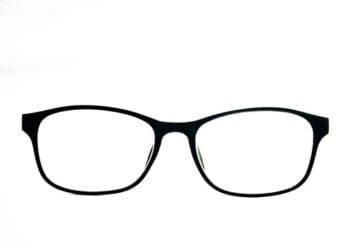Last Updated
Further Reading
- 8 Eyeglass Trends
- Trifocals
- What People Did Before Glasses
- How to Find Your Pupillary Distance
- Cheap Sunglasses Dangers
- Anti-Reflective Coating
- How Much Should You Spend
- Photochromic & Transition Lenses
- Polarized vs. Regular Sunglasses
- Medicaid for Glasses
- 5 Ways (or Places) to Donate
- Trivex Lenses
- How to Choose Glasses for Your Face Shape
- Prism Glasses for Double Vision
- What is Neurolens?
- Cleaning Eyeglasses
- Organizations That Help Provide Eyeglasses
- SPH & Prescription Meanings
- Aspheric Lenses
- Safety Glasses
- Prescription Sunglasses
- Crizal Lenses
- Can Glasses Make Vision Worse?
- Post-Cataract Sunglasses
- Glasses For Computer Vision Syndrome
- What Strength Glasses Are Right for You?
- How Often You Should Change Glasses
- Can Glasses Really Fix Colorblindness?
- Signs You May Need Glasses
- Glasses After Cataract Surgery
- Adjusting to Your First Pair of Glasses
- High Index Lenses
- Best Glasses Lenses in 2020
- HD Glasses Improve Your Vision
- Blue Light Glasses
- What to Know About Your Eye Prescription
- Anti-Reflective Lens Options
- Prescription Sports Glasses for Children
- Glasses Online vs. In-Store
- Can Glasses Help With Night Driving?
- Progressive Glasses Lenses
- Glasses After LASIK
What Are the Best Macular Degeneration Glasses in 2022?
Home / Everything About Glasses /
Last Updated
Many individuals over the age of 60 encounter challenges with their vision due to macular degeneration, a condition that can impair both near and distant sight. Macular degeneration glasses are specialized eyewear designed to enhance vision, compensating for the limitations that standard glasses cannot address. These glasses offer hope for improved visual function, tailored to the unique needs and stages of macular degeneration that an individual may experience.
Table of Contents
Glasses for macular degeneration are specialized products that can enhance near and distance vision in people with macular degeneration that cannot be improved with regular glasses.
In addition to understanding the different types of glasses for macular degeneration, it is helpful to know whom they are most appropriate for. Your current state of macular degeneration makes a significant impact on which eyeglass products will be the most beneficial to you.
There are currently a number of eyeglass products on the market designed specifically to help people with low vision caused by macular degeneration. If you are interested in getting a pair of macular degeneration glasses, speak with a low-vision specialist about which products and prescriptions would be the most appropriate and helpful for you.

Age-Related Macular Degeneration
Age-related macular degeneration (AMD) is the leading cause of vision loss among people ages 50 and older, and it is most likely to occur in people over the age of 60.
While age is the biggest risk factor for AMD, other factors can contribute. These include:
- Smoking. Smokers are up to four times more likely to develop age-related macular degeneration than people who never took up smoking.
- Genetics. If members of your immediate family developed AMD, you are more likely to as well.
- Elmiron. Studies have shown that people who regularly took the blood thinner Elmiron for an extended period of time are more likely to develop AMD.
- Cardiovascular issues. People who suffer from cardiovascular disease are more likely to develop AMD.
With AMD, the macula is damaged over time. The macula is a small point near the center of the retina that is responsible for creating sharp, central vision needed for looking at objects straight ahead.
The progression of AMD is different for everyone. Some people may not experience much vision loss for a long time, while others lose all vision in one or both eyes.
As AMD progresses, a blurred spot in your central field of vision grows larger. This can cause blank spots in your vision or cause objects to not appear as bright as they used to be. As the disease gets worse, people experience more difficulty with daily activities, such as driving, reading, writing, and recognizing faces.
Types of Glasses for Macular Degeneration

If you would like glasses to relieve symptoms caused by advanced macular degeneration, it is important to find special macular degeneration glasses. Regular glasses lenses are only able to focus light onto the damaged cells in the macula. The picture will still be blurred because no accommodation has been made for the damaged macula.
With macular degeneration sunglasses, two special lenses are used to provide better magnification and make blind spots appear smaller.
Types of glasses for macular degeneration include:
- Low vision glasses. Important for helping AMD, these glasses provide high-powered magnification to reduce the size of blind spots. Different lenses can be used with special tints and coatings to improve the transmission of light, reduce glare, and improve the ability to see contrasts. These glasses are best suited for reading, writing, working on the computer, playing cards and other games, and doing any close-up activities.
- Distance vision glasses. Special binoculars or small telescopes can be mounted onto glasses to improve central vision of items far away. These are best suited for watching TV, going to the theater, watching a sports game, and looking at nature or anything far away.
Who Are the Glasses Right For?
Finding the right type of macular degeneration glasses for yourself depends greatly on the level of AMD you have. To begin, many people with AMD benefit greatly from getting an updated measurement of their refraction to determine which power of lens will benefit them the most. Once you have a current picture of your AMD, you can look for the glasses that will help you the most.
The varying stages of AMD call for different glasses.
- Early AMD: Someone with early AMD may have very little vision impairment. Progressive bifocals or having separate pairs of regular eye glasses to assist with near and distance vision may be enough.
- Early to Moderate AMD: People experiencing drusen, or white spots on the retina caused by AMD, can have difficulty seeing in a dark room when they first come inside and have decreased sensitivity to seeing contrasts. Yellow-tinted glasses can help someone with these challenges distinguish between colors more easily.
- Advanced AMD: People with advanced AMD are likely to benefit the most from special macular degeneration glasses, like the ones explained above. High-magnifying and built-in prisms in specialized glasses help the two eyes to work together to assist with near vision, while small mounted telescopes can improve distance vision.
If you are not sure which stage of AMD you may have, speak with your optometrist. They can provide a thorough consultation with comprehensive testing to make an accurate diagnosis of your AMD and determine the most appropriate type of glasses for you.
Macular Degeneration Glasses Brands
In order to improve vision for people with AMD, a number of companies have developed high-tech products. Products designed to help low-vision include magnifiers for macular degeneration (handheld magnifiers, desktop magnifiers, video magnifiers), apps, and wearable glasses. As one of the most practical aids available, wearable glasses are a popular, although expensive, visual correction device.
Brands of AMD glasses include:
- The Jordy Portable System. With a built-in HD autofocus camera, HDMI input for watching TV, and the ability to work as a desktop video magnifier, these are a popular version of AMD glasses. They cost $3,000 to $4,000, however, and a doctor’s prescription is required.
- The Eschenbach Max TV Glasses. Special binoculars are mounted onto the lenses of these glasses to help with distance vision associated with watching TV, sports events, going to concerts, and exploring outside. Available on Amazon, these glasses cost under $200 and can be customized with your proper prescription.
- eSight: Electronic glasses developed by eSight are smart glasses for people who are legally blind. They can be life-changing for people with extreme vision impairments, but also cost close to $10,000 a pair.
- NuEyes: This company provides lightweight electronic wearable smart glasses for people with visual impairments. With prices ranging from $1,500 to $3,000, they are a slightly more affordable option.

Does Insurance Cover AMD Glasses?
While insurance usually covers the cost of some AMD-related treatments, such as eye injections, plans usually don’t often cover the cost of AMD glasses.
Since these glasses can be quite expensive, it’s important to confirm your coverage ahead of time so you don’t end up surprised by your out-of-pocket cost.
Contacts With Age-Related Macular Degeneration
People with AMD are able to wear contact lenses, though some find them uncomfortable. Since contacts can result in some eye dryness, many people with AMD find it preferable to wear glasses.
Consult with your ophthalmologist on the best vision correction option for your situation.
Speak With Your Doctor About Macular Degeneration Glasses
If you are interested in getting a pair of macular degeneration glasses in 2022, it is important to speak with an optometrist who specializes in low vision. Low vision specialists are well informed about the options available for enhancing your near and distance vision. They can assess your current stage of AMD and write a prescription for lenses that will give you the greatest level of vision improvements.
Although AMD is degenerative, glasses can go a long way in managing symptoms and improving your quality of life.
References
- Facts About Age-Related Macular Degeneration. (November 2018). National Eye Institute.
- Glasses and Macular Degeneration. (October 2018). Bright Focus Foundation.
- Smoking and Sight Loss. Macular Society.
- Overview of Risk Factors for Age-Related Macular Degeneration (AMD). (2015). Journal of Stem Cells.
- Macular Degeneration. Drugwatch.
The information provided on this page should not be used in place of information provided by a doctor or specialist. To learn more, read our Privacy Policy and Editorial Policy pages.
Further Reading
- 8 Eyeglass Trends
- Trifocals
- What People Did Before Glasses
- How to Find Your Pupillary Distance
- Cheap Sunglasses Dangers
- Anti-Reflective Coating
- How Much Should You Spend
- Photochromic & Transition Lenses
- Polarized vs. Regular Sunglasses
- Medicaid for Glasses
- 5 Ways (or Places) to Donate
- Trivex Lenses
- How to Choose Glasses for Your Face Shape
- Prism Glasses for Double Vision
- What is Neurolens?
- Cleaning Eyeglasses
- Organizations That Help Provide Eyeglasses
- SPH & Prescription Meanings
- Aspheric Lenses
- Safety Glasses
- Prescription Sunglasses
- Crizal Lenses
- Can Glasses Make Vision Worse?
- Post-Cataract Sunglasses
- Glasses For Computer Vision Syndrome
- What Strength Glasses Are Right for You?
- How Often You Should Change Glasses
- Can Glasses Really Fix Colorblindness?
- Signs You May Need Glasses
- Glasses After Cataract Surgery
- Adjusting to Your First Pair of Glasses
- High Index Lenses
- Best Glasses Lenses in 2020
- HD Glasses Improve Your Vision
- Blue Light Glasses
- What to Know About Your Eye Prescription
- Anti-Reflective Lens Options
- Prescription Sports Glasses for Children
- Glasses Online vs. In-Store
- Can Glasses Help With Night Driving?
- Progressive Glasses Lenses
- Glasses After LASIK